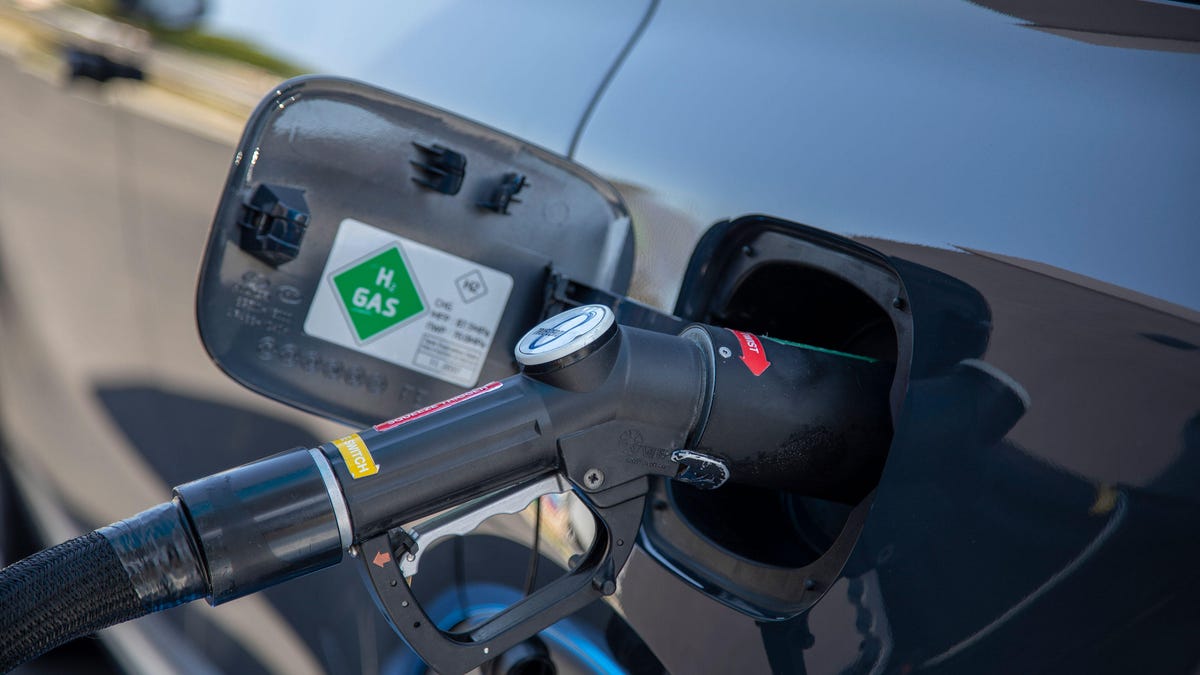Is it time to buy a fuel cell car?
You may not see one pull alongside you any time soon, but they're far from dead.

After the initial hype around the Toyota Mirai and Honda Clarity, fuel cell cars remain exceedingly rare, even in California which is their most welcoming market. None of that, however, negates the fact that they are the holy grail of electric cars: Long range, fast fill-ups, zero toxic vehicle emissions and, potentially, a clean process to generate their fuel.
The first fuel cell vehicle was tested on US roads back in 1966. The GM ElectroVan embraced innovations in fuel cell technology fostered by NASA development during the space race. As you can see in the cutaway below, they have to use a van because the fuel cell, batteries and hydrogen tanks were enormous and inefficient. Today a more potent hydrogen powertrain fits in roughly a quarter of the space.
The GM ElectroVan was the first major brand consumer fuel cell vehicle developed in the U.S.
Today, the Toyota Mirai, Honda Clarity, Hyundai Nexo and Mercedes GLC F-Cell make up most of the small pantheon of hydrogen electric cars. They're all electric cars but they use hydrogen cracked in a fuel cell to create electricity rather than pulling it from a huge battery that needs to be plugged in for a relatively long time. Fuel cell cars do have batteries, but they tend to be quite a bit smaller and lighter than those in a Tesla or Leaf because the fuel cell creates direct power on demand, as well as caching some in on-board batteries.
Sales of fuel cell vehicles in the US added up to a mere 2,500 cars in the last full year according to sales tracker EV Volume. That may grow to around 16,000 by sales year 2020, which will be less than a tenth of a percentage of all cars sold in the US.
Toyota plans to move the Mirai from its current limited-volume hand assembly process to volume production in the next few years, even though the car's selling at roughly 1/10 the rate it hoped.
Within that, however, California foresees encouraging growth. The industry and government California Fuel Cell Partnership's latest forecast expects there to be 1 million hydrogen fuel cell vehicles on California's roads by 2030, compared to the roughly 15 million total cars registered in the state today. Those million hydrogen cars would be supported by a projected 1,000 hydrogen fueling stations around the state by 2030, compared to fewer than 50 hydrogen stations and 8,300 gas stations today.
You can count the number of hydrogen fueling stations in California -- and this is considered fuel cell country. But the industry and regulators expect that number will increase to 1,000 stations by 2030.
And while Elon Musk leads a loud chorus of fuel cell vehicle doubters, something is stirring out there in the automotive industry that suggests a lot of money is still placing big hydrogen bets.
Robert Bosch, the largest supplier of parts and technology to the auto industry, recently announced it's betting big on fuel cells, planning for mass scale production of a new fuel cell design that will make sense in affordable cars by 2022.
Hyundai just bet almost 7 billion dollars on fuel cell cars. It's aiming to produce half a million of them, including the new Hyundai Nexo SUV, by the year 2030.
Audi just struck a deal to partner on fuel cell technology with Hyundai. The company's chairman, Bram Schot, recently said that Audi is redoubling its focus on fuel cell with a production car out in 2021. It's apparently doing so as the R&D lead for the entire VW group.
Mercedes is developing the fuel cell GLC F-Cell for limited release soon, taking the unusual step of making it a plug-in/fuel cell hybrid to ease concerns about getting stranded far from an H2 station. And BMW is expected to launch a limited run of fuel cell X5s in the early 2020s.
If you think the minor sales of fuel cell cars so far has shelved the idea, think again. Toyota is launching the second-gen Mirai in a couple of years, moving it from a limited production car to full mass production with much lower cost to assemble.

